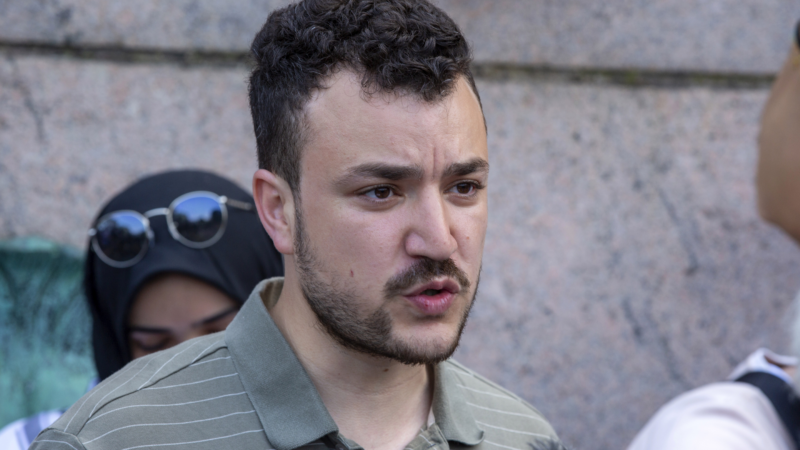Trump administration lays out its evidence for deporting activist Mahmoud Khalil
The day before activist Mahmoud Khalil was arrested by immigration authorities, Secretary of State Marco Rubio sent a two-page letter to the Department of Homeland Security accusing the Columbia University graduate student of participating in “antisemitic protests and disruptive activities.”
That letter is now at the heart of the Trump administration’s case against Khalil, according to his attorneys.
The letter, which is dated March 7, was released by Khalil’s legal team on Thursday, the day after the Trump administration submitted it in an immigration court filing. Rubio writes that Khalil’s continued presence in the U.S. would have “potentially serious adverse foreign consequences, and would compromise a compelling U.S. foreign policy interest.”
But Khalil’s lawyers say the government has provided no additional evidence to explain the basis for Rubio’s conclusion.
“Two pages. That’s it,” said Marc Van Der Hout, one of Khalil’s lawyers. “There is no there there at all.”
Lawyers for the Department of Homeland Security released their evidence against Khalil, who is a lawful permanent resident, after an immigration judge in Louisiana ordered them to do so at a hearing on Tuesday.
The Trump administration is trying to deport the 30-year-old, who played a prominent role in campus protests last year. Judge Jamee Comans said she will rule on Friday whether Khalil can be deported, or whether he must be freed. Whichever side loses is likely to appeal to the Board of Immigration Appeals.
Khalil’s case has become a crucial test for how far the Trump administration can go to deport noncitizen protesters. Khalil insists he was expressing support for Palestinians in Gaza, while administration officials accuse him of providing support to Hamas terrorism.
Khalil’s legal case is proceeding on multiple tracks. While an immigration judge considers the evidence against him, Khalid’s lawyers are also challenging his March 8 detention in federal court in New Jersey.
After ICE agents arrested Khalil on March 8 and shipped him to Louisiana, Rubio said he had revoked Khalil’s green card.
Rubio relied on a rarely used statute from the Immigration and Nationality Act of 1952 that authorizes the secretary of state to personally order the deportation of people whose presence in the U.S. the secretary believes “would have potentially serious adverse foreign policy consequences for the United States.”
But in 1990, after the Cold War ended, lawmakers modified the law to protect “beliefs, statements, or associations” that are “lawful within the United States,” and raised the standard for deportation to cases in which the foreigner’s presence in the U.S. would “compromise a compelling United States foreign policy interest.”
Khalil’s lawyers say that Rubio’s letter alone does not meet that high standard.
“His determination, quote unquote, has absolutely nothing to do with foreign policy,” Van Der Hout said during a Zoom meeting with reporters on Thursday. “What does he talk about? He talks about First Amendment activity in the United States, and the effect on people in the United States.”
Days after Khalil was arrested and detained, Homeland Security officials charged him with several additional civil violations. They allege he withheld information on his 2024 green card application, including his work history with a United Nations relief agency and his involvement with a pro-Palestinian activist group at Columbia University.
Khalil’s lawyers deny those charges. The government filed additional documents on Wednesday in support of those charges, Van Der Hout said, “but it is zero to do with the foreign policy charge. And there is zero support for the government’s allegations about any misrepresentation.”
Free speech advocates argue the administration is violating the U.S. Constitution by targeting immigrants for their activism and their political beliefs. Khalil and several other students and scholars who have been detained have challenged their arrests on constitutional grounds.
NASA rolls out Artemis II craft ahead of crewed lunar orbit
Mission Artemis plans to send Americans to the moon for the first time since the Nixon administration.
Trump says 8 EU countries to be charged 10% tariff for opposing US control of Greenland
In a post on social media, Trump said a 10% tariff will take effect on Feb. 1, and will climb to 25% on June 1 if a deal is not in place for the United States to purchase Greenland.
‘Not for sale’: massive protest in Copenhagen against Trump’s desire to acquire Greenland
Thousands of people rallied in Copenhagen to push back on President Trump's rhetoric that the U.S. should acquire Greenland.
Uganda’s longtime leader declared winner in disputed vote
Museveni claims victory in Uganda's contested election as opposition leader Bobi Wine goes into hiding amid chaos, violence and accusations of fraud.
Opinion: Remembering Ai, a remarkably intelligent chimpanzee
We remember Ai, a highly intelligent chimpanzee who lived at the Primate Research Institute of Kyoto University for most of her life, except the time she escaped and walked around campus.
The near death — and last-minute reprieve — of a trial for an HIV vaccine
A trial was about to launch for a vaccine that would ward off the HIV virus. It would be an incredible breakthrough. Then it looked as if it would be over before it started.






